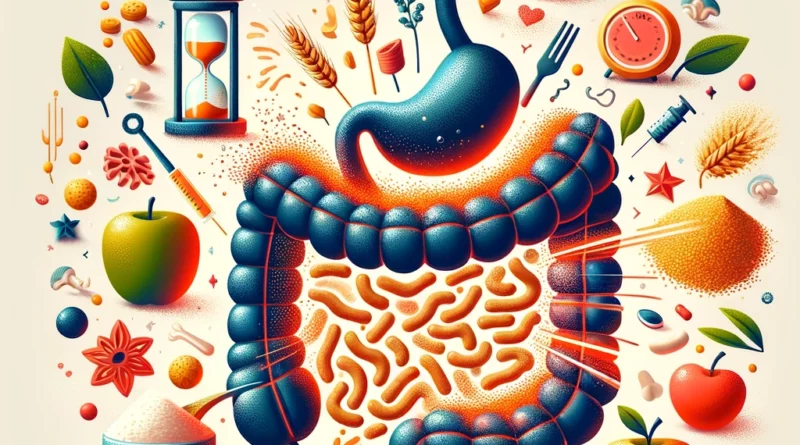The Duration of Gluten in Your Body: What You Need to Know
As someone living with celiac disease, the journey to understanding my body’s relationship with gluten has been both challenging and enlightening. Discovering that I had celiac disease was a turning point in my life, prompting me to delve deeply into what it means to live gluten-free and the impact gluten has on my body. The subject of how long gluten stays in the system of someone with celiac disease is particularly close to my heart, as it underscores the importance of vigilance in maintaining a strictly gluten-free diet.
For years, I struggled with symptoms that seemed to have no cause, feeling lost in a cycle of discomfort and confusion. It wasn’t until my diagnosis that the pieces began to fall into place, revealing that gluten was the culprit behind my health issues. The realization that even trace amounts of gluten could wreak havoc on my body for days, or even longer, was a wake-up call to the seriousness of managing my condition.
In this blog post, I want to share what I’ve learned about the duration of gluten in the body and why this knowledge is crucial for those of us with celiac disease.
When you consume gluten, it typically takes 1-2 days for your body to eliminate it. However, if you’re sensitive to gluten, the symptoms might linger even after the protein has been expelled.
Quick Facts
• Elimination Time: Gluten is processed and removed from your body within 1-2 days.
• Symptom Duration: Symptoms like fatigue and bloating can persist for days to weeks after exposure. For celiac disease sufferers, repairing intestinal damage can take months, despite a gluten-free diet.
Understanding Gluten Exposure
For individuals with celiac disease, gluten intolerance, or a wheat allergy, avoiding gluten is essential for managing symptoms and preventing long-term health issues. Gluten, found in wheat, rye, barley, and their hybrids, can cause a range of symptoms from digestive distress to systemic reactions.
After Gluten Exposure
• Immediate Reactions: Some symptoms improve within days of eliminating gluten from your diet.
• Long-Term Healing: More severe symptoms, such as those associated with celiac disease, may take longer to resolve as the body heals from the inflammation and damage caused by gluten.
Managing Gluten Intake
Navigating a gluten-free diet requires vigilance to avoid hidden sources of gluten and prevent cross-contamination. Even trace amounts can trigger symptoms and inflammation in sensitive individuals.
Tips for Managing Accidental Gluten Exposure
Accidentally consuming gluten can be a setback for anyone with gluten sensitivity or celiac disease. Here’s how to navigate the situation and ease your discomfort.
Listen to Your Body
• Hydrate: Increase your water intake to help flush out toxins and support your digestive system.
• Rest: Give your body time to recover by ensuring you get plenty of rest and avoid stress.
Dietary Adjustments
• Gentle Foods: Opt for easy-to-digest foods like broth-based soups, rice, and steamed vegetables to soothe your gut.
• Avoid Inflammatory Foods: Temporarily cut out dairy, caffeine, and spicy foods that can further irritate your digestive system. Supplements and Remedies
• Probiotics: Consider taking a probiotic supplement to help restore your gut flora balance.
• Digestive Enzymes: These can aid digestion and help break down any lingering gluten particles. Note: This is not a treatment for celiac disease but may help manage symptoms for non-celiac gluten sensitivity.
Seek Support
• Inform Your Doctor: If your symptoms are severe, contacting your healthcare provider is a good idea.
• Community Advice: Reach out to online forums or local support groups for tips and emotional support.
Prevention is Key
• Education: Learn to identify hidden sources of gluten in foods and personal care products.
• Meal Prep: Prepare gluten-free meals in advance to reduce the risk of accidental exposure.
Accidental gluten exposure can be challenging, but with these strategies, you can help mitigate the symptoms and get back on track with your gluten-free lifestyle.”
Key Takeaway
Gluten is expelled from your body within a couple of days, but the duration and severity of symptoms can vary greatly among individuals. Understanding your body’s response to gluten and carefully managing your diet are crucial steps in minimizing discomfort and promoting healing.
Sources
- How Long Does it Take for Gluten to Leave Your System? https://gluten.info/blog/how-long-does-it-take-for-gluten-to-leave-your-system/
- How Long Does Gluten Stay In Your System? https://www.glutenfreesociety.org/how-long-does-it-take-for-gluten-to-leave-your-system/
- Do I need a gluten detox? https://www.medicalnewstoday.com/articles/gluten-detox
Hi, I'm Linda, a mom diagnosed with Celiac Disease. In this space, I share my experiences and knowledge about gluten-free living, from family-friendly cooking to navigating daily life. Join me on this journey, and let's explore the ins and outs of a gluten-free lifestyle together ❤️



